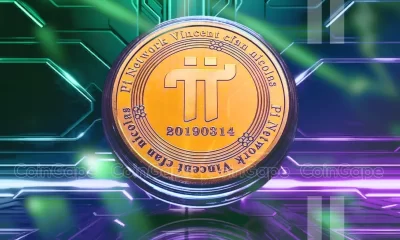Adoption
Is web3’s innovative explosion constraining user adoption?
Published
5 months agoon
By
admin
Disclosure: The views and opinions expressed here belong solely to the author and do not represent the views and opinions of crypto.news’ editorial.
In the decade since Ethereum co-founder Gavin Wood first coined the term “web3,” we’ve seen the promise of a new digital empire rise into reality. Cryptocurrency has become a trillion-dollar mainstain of the global economy; NFTs have entrenched themselves in high-stakes art and investment trades; blockchain-based financial services have transitioned from novelty to normal.
For all the above, we can thank the dreamers and developers who took it upon themselves to create solutions that consumers didn’t even know they needed. It’s not a stretch to say that their creative determination built our nascent web3 empire; today, the ecosystem encompasses tens of thousands of dApps and an expansive variety of defi services.
The question is, will that same creativity topple it, too?
In theory, web3’s innovative explosion should accelerate user adoption. As offerings multiply and diversify, the ecosystem naturally becomes more intriguing. However, while user adoption has been respectable enough in recent years, the rates we see today are far disproportionate to web3’s apparent value proposition.
Why? We have a chain fragmentation problem. According to a report from CoinPaper, over 1,000 distinct blockchains were operational as of January 2024. The Ethereum ecosystem features over 50 L2s today, with another 50-plus anticipated to go live soon, all competing for users and liquidity.
This fragmentation has an intense impact on experience. Users often need to manually switch between networks within their wallets or interfaces, which can be confusing and lead to frustrating (or even costly) errors. L2, L2, and L3 chain proliferation forces users to keep their available assets and gas tokens in their wallets if they want to sample emerging applications built on those chains. And when they do, they face a learning curve: each blockchain poses its own set of rules, transaction fees, and functionalities.
Given these challenges, is it any wonder that mainstream consumers have hesitated to leap into web3? To unlock widespread user adoption among mainstream consumers, we must deliver more seamless, intuitive user experiences.
The intuitive answer would seem to be to encourage developers to improve cross-chain compatibility and interoperability. However, relying on individual developers to provide global interoperability is a bit like asking someone to empty the ocean with a bucket: the scale of the challenge renders the request laughable.
Today, the web3 ecosystem features a thousand active blockchains; we could see ten times more in five years. Blockchains are proliferating at an exponential rate as innovators build chains that cater to particular industries, interests, or business use cases—and given the early success and adoption of the blockchain modularity thesis, this fragmentation will likely intensify.
But even if chain proliferation was a tenth as quick as it is today, developers could never keep up. Unlike web2, where innovators can build once and attract users from across the internet with few limitations, web3 developers typically need to deploy instances of their apps on multiple chains to chase users and liquidity. As a result, developers need to spend their time building insecure, inefficient, and inelegant cross-chain messaging solutions rather than elevating their core value proposition.
To return to our empire metaphor: instead of expanding web3’s reach and resources, architects and builders are reduced to patching cracks and digging connective tunnels between city sections, exhausting themselves with work that most denizens will never see or appreciate.
So, how do we alleviate web3’s user experience problems and give developers more time for value-adding innovation? The answer lies in chain abstraction.
Imagine a world where our fragmented chains were abstracted away. Developers might build a single instance of their app on the chain of their choosing and attract users across any chain without interruption or inconvenience; users would not need to know which chain that app was built on or worry whether their assets and gas tokens are compatible.
To build this functionally abstracted ecosystem, web3 advocates would need to meet several requirements. First, user balances would need to be unified, aggregated, and accountable across all chains to ensure that users could spend their balances freely without hassle while preventing intentional or accidental overdrafts. Additionally, developers should not need to incorporate complex integrations into their solutions to facilitate cross-chain accessibility.
Much like Rome, an abstracted web3 empire won’t be built in a day—but there’s little doubt that we need to start building today. Unless there is an ecosystem-wide effort to prioritize abstraction, we won’t have the opportunity to unlock mainstream adoption. We owe it to the web3 architects and innovators to ensure that their visionary work receives the acclaim, appreciation, and utilization it deserves.

Mayur Relekar
Mayur Relekar is the co-founder of Arcana. A former chief products officer at Wow Labz, Mayur co-founded Arcana to simplify blockchain complexities and enhance user experience. The company is backed by top industry funds and angels, including Balaji Srinivasan, Polygon Ventures, Republic Crypto, and Woodstock Fund.
Source link
You may like


Metaplanet makes largest Bitcoin bet, acquires nearly 620 BTC


Tron’s Justin Sun Offloads 50% ETH Holdings, Ethereum Price Crash Imminent?


Investors bet on this $0.0013 token destined to leave Cardano and Shiba Inu behind


End of Altcoin Season? Glassnode Co-Founders Warn Alts in Danger of Lagging Behind After Last Week’s Correction


Can Pi Network Price Triple Before 2024 Ends?


XRP’s $5, $10 goals are trending, but this altcoin with 7,400% potential takes the spotlight
Adoption
Ohio introduces second Bitcoin reserve bill
Published
3 days agoon
December 19, 2024By
admin

The State of Ohio has introduced a second Bitcoin reserve bill as crypto legislation gains momentum across the U.S. ahead of Donald Trump’s inauguration.
Ohio House GOP Majority Whip Steve Demetriou proposed legislation to allow the state to manage a strategic Bitcoin (BTC) reserve, Satoshi Act Fund founder Dennis Porter shared on Dec. 19 during an X Spaces event.
Demetriou’s bill follows a similar proposal from Representative Derek Merrin, which would also position Ohio as a Bitcoin reserve holder. Speaking on X Spaces, Demetriou explained that his legislation would enable Ohio to allocate up to 10% of its state-controlled funds toward a BTC stockpile.
“Bitcoin can help tap into Ohio’s existing energy reserves,” Demetriou added. Ohio is famed for having massive natural gas reserves and a competitive energy grid.
The Ohio GOP Majority Whip provided no specific timeline for the bill’s passage but expressed hope that House bureaucracy would not delay progress.
BREAKING: Ohio introduces a 2nd bill to create a Strategic Bitcoin Reserve. This will be the lawmaker that passes it into law.
— Dennis Porter (@Dennis_Porter_) December 19, 2024
American legislative conversations have increasingly focused on BTC-related proposals following President-elect Donald Trump’s victory in the recent election.
Earlier, Porter said that the Bitcoin renaissance was spotted amassing momentum in over 12 states and counting. Texas, Ohio, and Pennsylvania were a few states that weighed BTC reserve laws.
In Washington, Senator Cynthia Lummis has advocated for federal BTC reserve policies. Responding to Federal Reserve Chair Jerome Powell, Lummis argued that the Senate should authorize the central bank to hold Bitcoin. Powell previously clarified that the Fed cannot own BTC under current laws.
Source link
Adoption
Wyoming seeks developers for state-backed stablecoin
Published
2 weeks agoon
December 9, 2024By
admin

The State of Wyoming is hiring blockchain developers to support the creation of its government-issued stablecoin currency.
The Wyoming Stable Token Commission has issued public Requests for Qualification to attract talent for its stablecoin initiative, known as “Project WYST.”
Stablecoins are digital currencies that trade with 1:1 dollar parity, allowing users to deploy U.S. dollars in blockchain markets and decentralized finance venues. The sector has over $200 billion in circulation, and stabelcoins feature in most cryptocurrency transactions, according to the U.S. Treasury Department.
Applicants have until Dec. 12 to submit their proposals for roles that include token development, support, listing, on-chain analysis, reserve management, financial auditing, and ecosystem intelligence.
WYST details remain limited, but Commission discussions indicate it may launch on Ethereum or Solana networks.
ICYMI: our public Request For Qualification period is underway.
7 RFQs are now open to support the development of the world’s first state-issued and fiat-backed stabletoken.
Submission deadline is Dec 12 2024 @ 5PM MT.
Apply now at the RFQ Info Center: https://t.co/u5OKK0QHWm
— wyostable (@wyostable) December 4, 2024
The Wyoming Stable Token Act, passed in 2023, authorized the state to issue stablecoins. According to the WyoStable Commission website, WYST is designed to represent and be redeemable for one U.S. dollar held in trust by the state. Tokens will only be issued in exchange for U.S. dollars.
WYST is a proposed virtual currency representative of and redeemable for one (1) United States dollar held in trust by the state of Wyoming as provided by W.S. 40‑31‑106. Stable tokens shall only be issued in exchange for United States dollars.
WyoStable Commission website
Wyoming has positioned itself as a web3 leader with U.S. borders. In March, the state officially recognized decentralized autonomous organizations as legal entities.
The landmark crypto bill reaffirmed sovereign acceptance for DAOs amid regulatory uncertainty, predominantly from the Securities and Exchange Commission. Kraken also launched its licensed custody solution in the state in March.
Back in February 2023, local lawmakers passed a bill to protect crypto self-custody, protecting the right to hold Bitcoin (BTC) and other digital assets. Wyoming Senator Cynthia Lummis was at the forefront of Federal Congressional efforts to establish a national Bitcoin reserve. Thousands penned letters supporting her BITCOIN BILL, per crypto.news reporting.
Other states were following suit and mulled Bitcoin reserve legislation as the U.S. voted its first pro-BTC president in Republican Donald Trump.
Source link
Adoption
Bitcoin advocate hints at ‘strategic reserve’ laws in 10 US states
Published
3 weeks agoon
December 3, 2024By
admin

Satoshi Act Fund founder Dennis Porter announced that several U.S. states are preparing to propose legislation for sovereign Bitcoin reserves.
In an attempt to front-run President Donald Trump’s Bitcoin (BTC) promise, Porter has lobbied local policymakers to introduce legislation for BTC stockpiles across 10 state jurisdictions. Porter disclosed the development via an X thread, highlighting efforts from his Satoshi Act Fund organization toward passing Bitcoin-focused laws.
I can now officially confirm and announce that 10 states will be introducing ‘Strategic Bitcoin Reserves’ legislation here in the great United STATES of America. We are going to win with Bitcoin. We will lead the world. No one will come close. The word will follow our lead.
Dennis Porter, Satoshi Act Fund founder and CEO
The public BTC supported also announced a joint discussion with Wyoming Senator Cynthia Lummis regarding her BITCOIN ACT, suggesting that Porter has engaged federal lawmakers to position the U.S. as a Bitcoin leader.
Lummis’s proposal would transfer 207,000 BTC seized by authorities to the Treasury Department. The Senator also pushed to convert U.S. gold certificates to finance BTC purchases and accumulate one million coins over five years.
“The race is on. Let the game theory begin,” Porter tweeted, referring to President Trump’s plan to establish a government BTC stockpile from America’s existing $19 billion horde.
I am convinced I will pass Strategic Bitcoin Reserve legislation at the state level before @realDonaldTrump. The only way he wins is if he does an executive order the very first week he is in office.
The race is on.
Let the game theory begin.
— Dennis Porter (@Dennis_Porter_) December 3, 2024
Nations, states, and governments are rushing to grab portions of BTC’s 21 million fixed supply following Trump’s victory at the presidential polls. Within the U.S., Pennsylvania already passed a bill legalizing BTC payments and crypto self-custody. The state also introduced a bill paving the way for its own BTC reserve in November.
On the international front, Brazil’s Senate considered pitching a national BTC reserve to President Luiz Inácio Lula da SilvaCongressman Eros Biondini submitted the idea to Brazil’s Chamber of Deputies as crypto.news reported.
Source link

Metaplanet makes largest Bitcoin bet, acquires nearly 620 BTC

Tron’s Justin Sun Offloads 50% ETH Holdings, Ethereum Price Crash Imminent?

Investors bet on this $0.0013 token destined to leave Cardano and Shiba Inu behind

End of Altcoin Season? Glassnode Co-Founders Warn Alts in Danger of Lagging Behind After Last Week’s Correction

Can Pi Network Price Triple Before 2024 Ends?

XRP’s $5, $10 goals are trending, but this altcoin with 7,400% potential takes the spotlight

CryptoQuant Hails Binance Reserve Amid High Leverage Trading

Trump Picks Bo Hines to Lead Presidential Crypto Council

The introduction of Hydra could see Cardano surpass Ethereum with 100,000 TPS

Top 4 Altcoins to Hold Before 2025 Alt Season

DeFi Protocol Usual’s Surge Catapults Hashnote’s Tokenized Treasury Over BlackRock’s BUIDL

DOGE & SHIB holders embrace Lightchain AI for its growth and unique sports-crypto vision

Will Shiba Inu Price Hold Critical Support Amid Market Volatility?

Chainlink price double bottoms as whales accumulate

Ethereum Accumulation Address Holdings Surge By 60% In Five Months – Details
182267361726451435

Why Did Trump Change His Mind on Bitcoin?

Top Crypto News Headlines of The Week

New U.S. president must bring clarity to crypto regulation, analyst says

Will XRP Price Defend $0.5 Support If SEC Decides to Appeal?

Bitcoin Open-Source Development Takes The Stage In Nashville

Ethereum, Solana touch key levels as Bitcoin spikes

Bitcoin 20% Surge In 3 Weeks Teases Record-Breaking Potential

Ethereum Crash A Buying Opportunity? This Whale Thinks So

Shiba Inu Price Slips 4% as 3500% Burn Rate Surge Fails to Halt Correction

Washington financial watchdog warns of scam involving fake crypto ‘professors’

‘Hamster Kombat’ Airdrop Delayed as Pre-Market Trading for Telegram Game Expands

Citigroup Executive Steps Down To Explore Crypto
Mostbet Güvenilir Mi – Casino Bonus 2024

NoOnes Bitcoin Philosophy: Everyone Eats
Trending

 3 months ago
3 months ago182267361726451435

 Donald Trump5 months ago
Donald Trump5 months agoWhy Did Trump Change His Mind on Bitcoin?

 24/7 Cryptocurrency News4 months ago
24/7 Cryptocurrency News4 months agoTop Crypto News Headlines of The Week

 News4 months ago
News4 months agoNew U.S. president must bring clarity to crypto regulation, analyst says

 Price analysis4 months ago
Price analysis4 months agoWill XRP Price Defend $0.5 Support If SEC Decides to Appeal?

 Opinion5 months ago
Opinion5 months agoBitcoin Open-Source Development Takes The Stage In Nashville

 Bitcoin5 months ago
Bitcoin5 months agoEthereum, Solana touch key levels as Bitcoin spikes

 Bitcoin5 months ago
Bitcoin5 months agoBitcoin 20% Surge In 3 Weeks Teases Record-Breaking Potential


